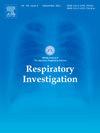Unfavorable response to capmatinib for MET exon14 skipping after first-line osimertinib in a patient with EGFR-mutated lung adenocarcinoma: A case report and literature review
IF 2.4
Q2 RESPIRATORY SYSTEM
引用次数: 0
Abstract
MET exon14 skipping mutations (METex14s) are rarely reported as a potential resistance mechanism to EGFR tyrosine kinase inhibitors (TKIs). The efficacy of targeted therapy against METex14s emerging after osimertinib resistance is uncertain. Herein, we report a case of EGFR-mutated metastatic lung adenocarcinoma in which METex14 was detected in a re-biopsy upon first-line osimertinib resistance. The patient received capmatinib monotherapy as third-line therapy, which was ineffective, followed by an exceptional response to salvage therapy with afatinib. This report highlights the heterogeneity of EGFR-TKI resistance and that targeting rare resistance mechanisms remains challenging.
一名表皮生长因子受体(EGFR)突变肺腺癌患者在一线奥西美替尼治疗后对卡帕替尼治疗MET外显子14缺失的不良反应:病例报告和文献综述
作为表皮生长因子受体酪氨酸激酶抑制剂(TKIs)的一种潜在耐药机制,MET外显子14跳跃突变(METex14s)鲜有报道。针对奥希替尼耐药后出现的METex14s的靶向治疗疗效尚不确定。在此,我们报告了一例表皮生长因子受体(EGFR)突变的转移性肺腺癌患者,该患者在一线奥希替尼耐药后再次活检时发现了METex14。该患者接受了卡帕替尼单药作为三线治疗,但效果不佳,随后对阿法替尼的挽救治疗产生了特殊反应。该报告强调了表皮生长因子受体-TKI耐药的异质性,以及针对罕见耐药机制的靶向治疗仍具有挑战性。
本文章由计算机程序翻译,如有差异,请以英文原文为准。
求助全文
约1分钟内获得全文
求助全文

 求助内容:
求助内容: 应助结果提醒方式:
应助结果提醒方式:


